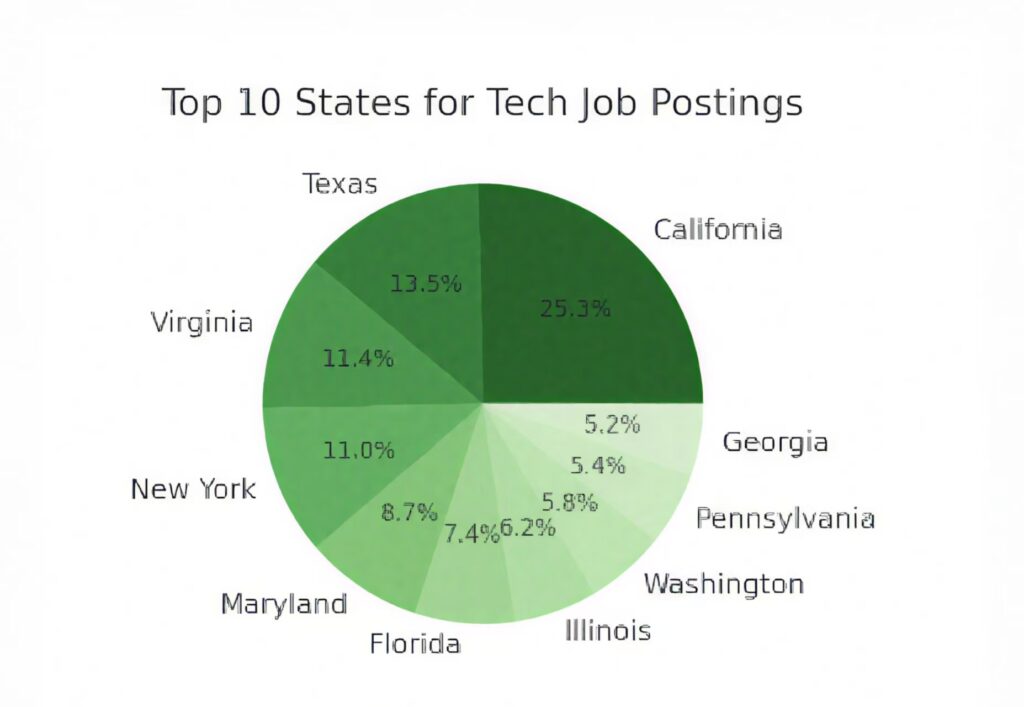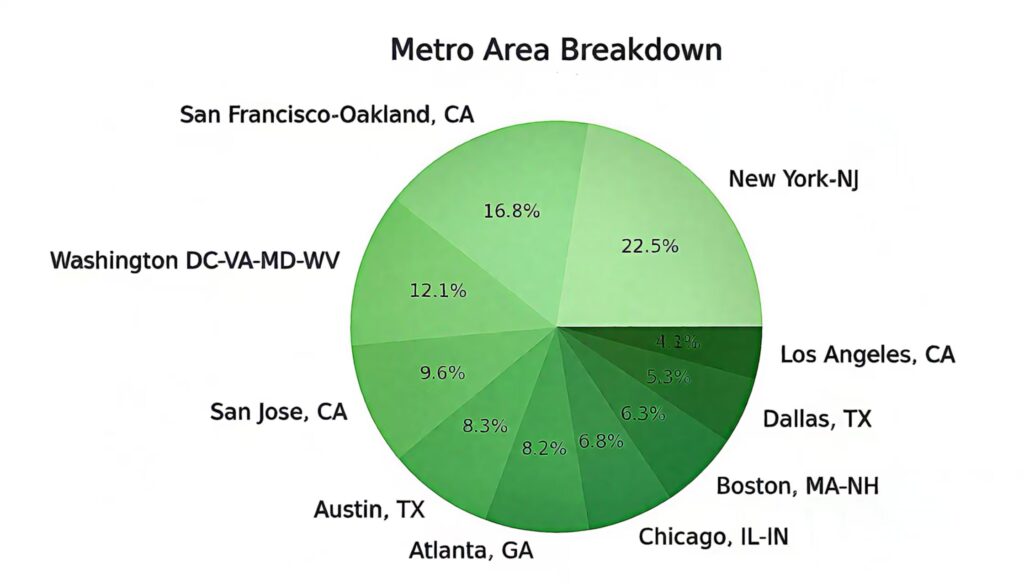The Geography of Tech Jobs in 2025: The Top 10 States and Sectors
Where are 2025’s tech jobs—and which sectors are hiring the fastest? Drawing from Jobright’s April 2025 data, in this article we’ll reveal the top 10 U.S. states and metro areas leading the charge in tech employment, along with the fastest-growing sectors driving demand.
As a job seeker, this data can be invaluable in helping you land your dream job. Read on for the full breakdown and key trends shaping the tech workforce this year.
Top 10 States for Tech Job Postings
In April 2025, slightly over half of all U.S. tech job postings were concentrated in these ten states.

California (13.1%) is the largest hub by a wide margin, thanks to Silicon Valley. AI‑centric startups, major tech campuses (Google, Meta, Salesforce), and venture funding are leading to openings in machine‑learning and data‑science engineering as well as cloud infrastructure.
Texas (7.0%) comes in second place, thanks to Austin, Dallas, and Houston. Apple’s chip‑design center, Tesla’s software teams, and Dell’s Round Rock operations underpin heavy demand for software engineers, embedded systems developers, and DevOps specialists.
Virginia comes in third with 5.9%. Defense contractors (like Northrop Grumman) and cybersecurity firms (like CrowdStrike) post positions for software engineers, DevSecOps experts, and security analysts. The presence of Amazon HQ2 in Arlington also adds to this.
It’s good to keep in mind that the top 10 states only account for 51.7% of all postings. So, nearly half are distributed across the remaining 40 states. This means that smaller markets still represent meaningful slices of the pie, offering opportunities in less saturated regions.
Leading Industries for Tech Talent
Tech hiring is no longer confined to the traditional tech industry. The April 2025 data highlights a diversification of demand across several sectors. These are the leading industries.

As you can see, traditional tech industries are strong, but the rise of Government Relations and Defense & Space suggests a strong push in public sector hiring. This could tie into federal infrastructure or cybersecurity initiatives.
Healthcare, Insurance, and Consulting are also active, indicating cross-sector digital transformation. These trends point to a future where tech skills are valuable in every corner of the economy, not just Big Tech.
That’s good news for job seekers—there are now more opportunities available outside of well-known tech companies.
Metro Area Breakdown
Zooming in to metro‑level concentrations highlights where employers are recruiting most intensively. Below are April 2025’s top ten metro areas.

New York-Newark-Jersey City (22.5%) is the standout leader. The San Francisco Bay Area (SF-Oakland at 16.8%, San Jose-Sunnyvale at 9.6%) shows a strong regional cluster. While the DC metro area (12.1%) reflects strong government/defense sector presence.
Meanwhile, Austin continues its rise as the “new Silicon Valley,” with major tech firms like Apple and Tesla expanding operations. Atlanta rounds out the top five, backed by its universities and growing startup ecosystem.
Implications for Job Seekers
What does this mean for job seekers overall?
Geography still matters. While remote roles exist, top hiring is concentrated in metros like New York (finance), San Francisco (tech), and DC (public sector). If you’re flexible on location, consider emerging hubs like Austin and Atlanta, with high demand and low cost of living.
Sector agility gives candidates an edge. Skills in AI, cybersecurity, and cloud computing are in high demand across sectors like healthcare, finance, and government, not just traditional tech. These skills can open more doors for you.
Understanding where the jobs are and aligning your skills accordingly are key to landing the right role in 2025.
Conclusion
Overall, the data show that while top tech hubs remain dominant, the landscape is gradually decentralizing: Texas, Virginia, and emerging metros such as Austin and Atlanta are also capturing growing shares of postings.
Industries such as healthcare, fintech, and government contracting are expanding their tech footprints, opening up new job opportunities.
Whether you’re early in your tech career or looking to pivot, aligning your skills with these regional and industry trends can make you more competitive in 2025’s evolving job market.
Want more data-driven insights on the job market? Check out our article The Intern & New Grad Job Market Unpacked.
